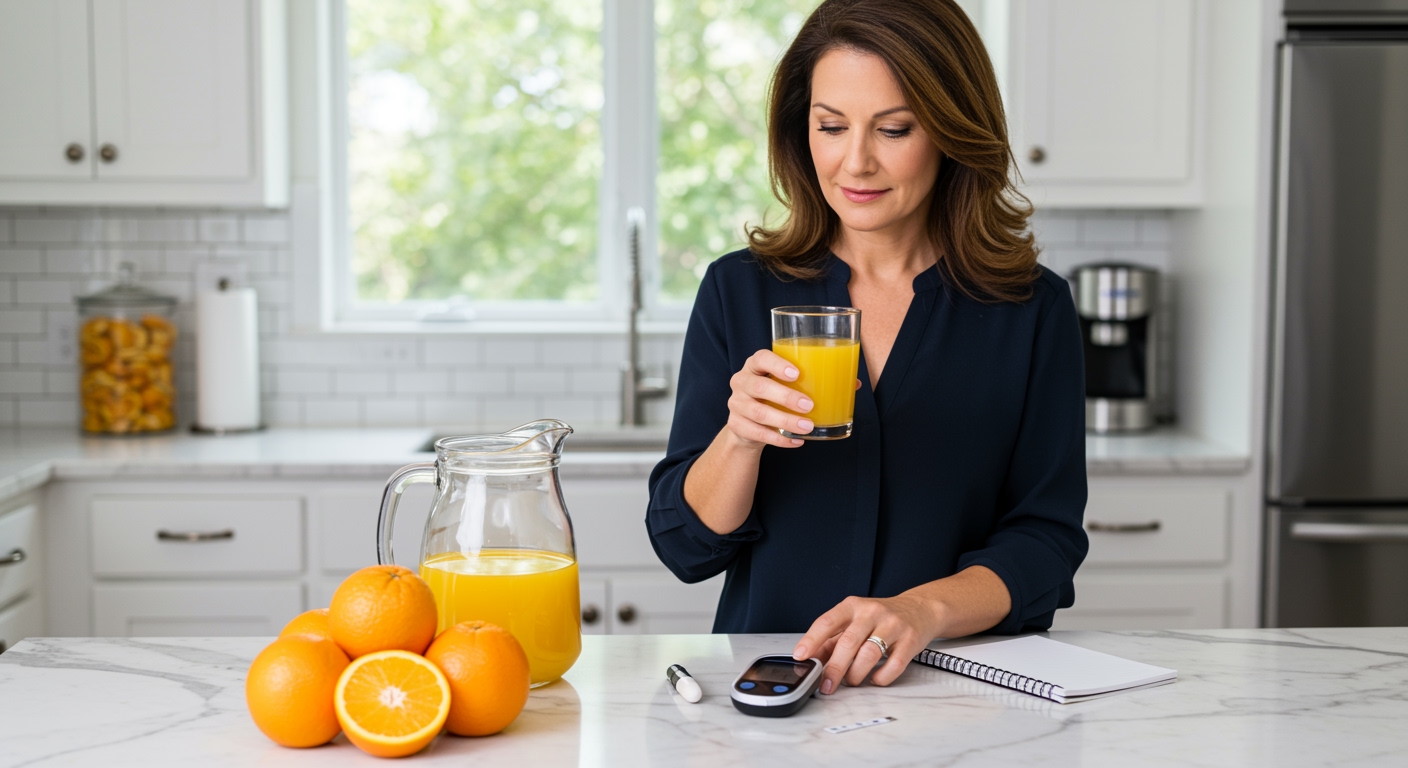✪ Key Takeaway: Orange juice can raise blood sugar quickly, but moderate amounts may fit into a diabetes meal plan with proper timing and monitoring.
Introduction
Your doctor says avoid sugary drinks, but then you see studies claiming orange juice might not be the villain everyone thinks it is.
You are probably asking this question because you love orange juice but worry about your blood sugar levels, or maybe your healthcare provider gave you conflicting advice about fruit juices.
Hi, I am Abdur, your nutrition coach and today I am going to explain the complex relationship between orange juice and diabetes management.
How Does Orange Juice Affect Blood Sugar?
Orange juice contains about 21 grams of sugar per 8-ounce serving, which enters your bloodstream faster than sugar from whole oranges.
When you drink orange juice, your digestive system breaks down the fructose and glucose within minutes, causing blood sugar levels to spike rapidly.
The glycemic index of orange juice ranges from 45 to 55, which places it in the moderate category rather than the high-risk zone.
Your pancreas responds to this sugar surge by releasing insulin to help cells absorb the glucose from your bloodstream.
People with diabetes often struggle with this process because their bodies either do not produce enough insulin or cannot use it effectively.
The absence of fiber in orange juice means there is nothing to slow down sugar absorption, unlike eating a whole orange which contains about 3 grams of fiber.
✪ Fact: One cup of orange juice contains the sugar equivalent of about 3-4 whole oranges without the beneficial fiber.
What Does Recent Research Say About Orange Juice?
A large European study published in 2024 found that 100% fruit juice consumption was not significantly associated with increased type 2 diabetes risk.
This research followed over 340,000 participants for more than 10 years and challenged the common belief that all fruit juices are equally harmful.
The study distinguished between pure orange juice and sugar-sweetened beverages, showing that natural fruit sugars may behave differently in the body.
However, other research shows that people who drink fruit juice regularly have a higher risk of developing diabetes compared to those who eat whole fruits.
The key difference lies in the processing and concentration of sugars, which affects how quickly they enter your bloodstream.
Scientists believe that the antioxidants and flavonoids in orange juice might provide some protective benefits that partially offset the sugar content.
✪ Note: Research results vary significantly based on study design, population, and juice quality examined.
Can People With Diabetes Drink Orange Juice Safely?
People with well-controlled diabetes can include small amounts of orange juice in their meal plan with careful monitoring.
The key is portion control – limiting yourself to 4 ounces or half a cup rather than drinking a full glass.
Timing matters significantly because drinking orange juice with a balanced meal containing protein and healthy fats can slow sugar absorption.
Your individual response to orange juice depends on factors like your medication regimen, activity level, and overall blood sugar control.
Some people with diabetes use small amounts of orange juice to treat low blood sugar episodes because it raises glucose levels quickly.
Regular blood sugar monitoring before and after drinking orange juice helps you understand your personal glucose response pattern.
✪ Pro Tip: Test your blood sugar 2 hours after drinking orange juice to see how your body responds.
What Are Better Alternatives To Orange Juice?
Whole oranges provide the same vitamin C benefits as juice while delivering fiber that helps regulate blood sugar absorption.
Diluting orange juice with water reduces the sugar concentration per serving while still giving you some of the flavor you crave.
Vegetable juices like tomato or carrot juice contain fewer sugars and more nutrients compared to most fruit juices.
Infused water with orange slices provides natural flavor without the concentrated sugars found in juice.
Unsweetened beverages like herbal teas or sparkling water with a splash of fresh orange juice offer better blood sugar control.
If you must drink orange juice, choose varieties with pulp included because the fiber content helps slow sugar absorption slightly.
✪ Fact: One medium orange contains only 12 grams of sugar compared to 21 grams in a cup of orange juice.
The Bottom Line
Orange juice is not completely off-limits for people with diabetes, but it requires careful consideration and moderation.
Smart nutrition choices come from understanding your individual response rather than following blanket rules, and orange juice can fit into a diabetes meal plan when consumed mindfully.
I would love to hear about your experiences with orange juice and blood sugar management, so please share your thoughts or questions in the comments below.
References
At NutritionCrown, we use quality and credible sources to ensure our content is accurate and trustworthy. Below are the sources referenced in creating this article:





